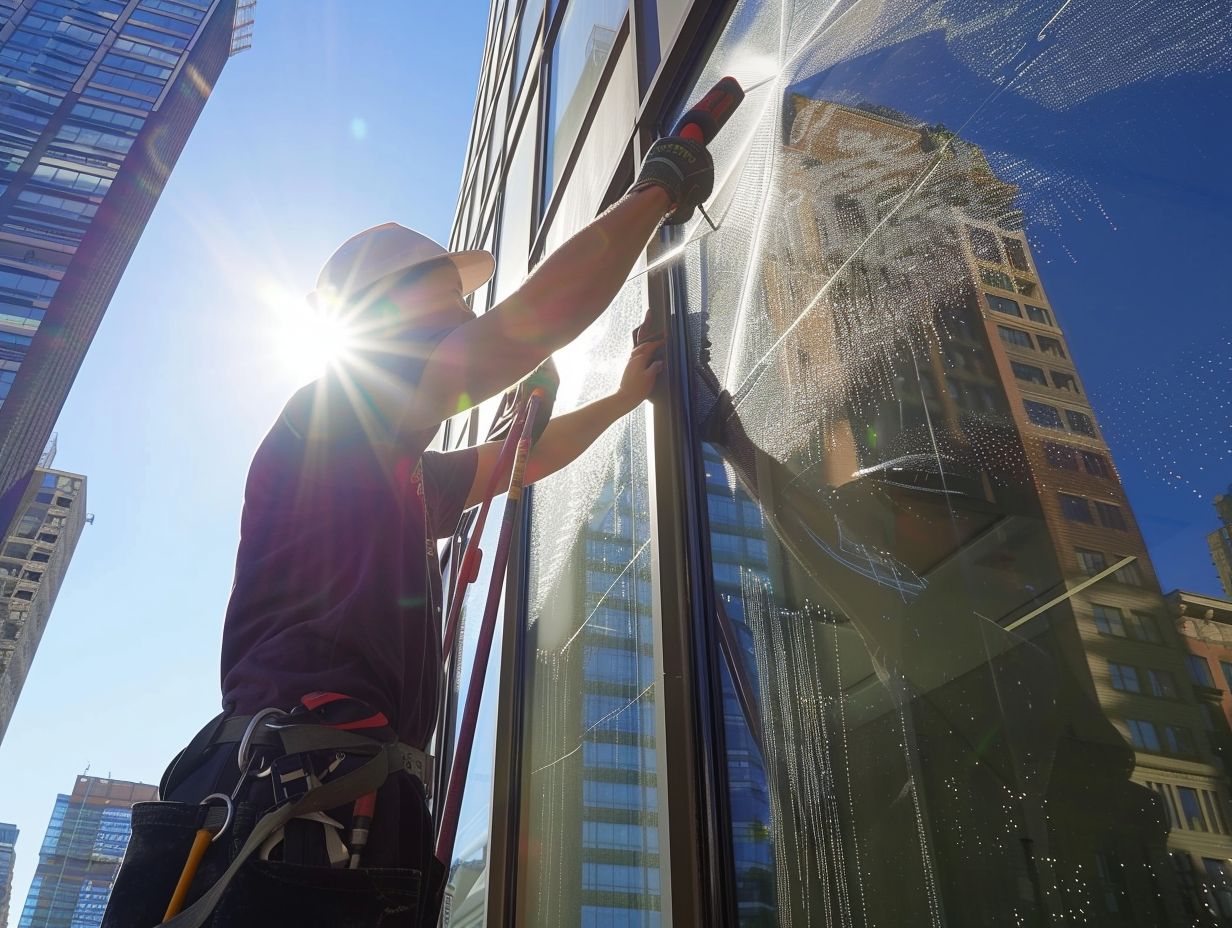Are you considering a career in window cleaning but unsure of how to get started?
Apprenticeships have played a crucial role in the evolution of the window cleaning trade, providing hands-on experience and valuable skills to aspiring professionals.
In this article, we will explore the history of apprenticeships in window cleaning, the benefits of choosing this path, how to find apprenticeship opportunities, what to expect during your training, and the importance of safety training in the industry.
Discover how apprenticeships can pave the way to a successful career in window cleaning.
What Is an Apprenticeship?

An apprenticeship is a structured training program that allows individuals to learn a specific skill or trade through a combination of on-the-job training and classroom instruction. It provides participants with hands-on experience and mentorship from experienced professionals in their chosen profession, enabling them to develop practical skills and advance their careers.
This hands-on approach to learning not only equips apprentices with technical skills but also fosters creativity, problem-solving abilities, and critical thinking. The mentorship aspect of apprenticeships is crucial as it offers personalized guidance, support, and wisdom that can only come from seasoned practitioners.
By working closely with a mentor, apprentices gain insights into industry best practices, learn from real-world challenges, and build a network of contacts within their field. Ultimately, apprenticeships bridge the gap between theoretical knowledge and practical application, preparing individuals for success in their chosen professions.
The History of Apprenticeships in the Window Cleaning Trade
The history of apprenticeships in the window cleaning trade dates back to ancient civilizations, where young individuals would learn the art of window cleaning through hands-on training and guidance from master window cleaners. Over time, this practice evolved to become more structured, with apprentices gaining valuable industry experience and developing essential trade skills.
These apprenticeships were key in passing down specialized knowledge and techniques, ensuring that the craftsmanship and precision associated with window cleaning were maintained. The structured nature of apprenticeship programs allowed for a systematic transfer of skills from generation to generation, contributing to the profession’s sustainability. As society progressed, formalized training programs and certifications emerged, further enhancing the reputation and standardization within the window cleaning industry.
How Has the Window Cleaning Trade Evolved Over Time?
The window cleaning trade has witnessed significant evolution over the years, moving from traditional manual methods to modern techniques that emphasize efficiency, safety, and quality. This evolution has been driven by advancements in technology, changes in industry standards, and the need for skilled professionals who possess in-depth knowledge of the trade.
As technology continues to advance, window cleaning professionals are now utilizing specialized equipment such as water-fed poles, robotic cleaners, and high-reach systems to access and clean windows in high-rise buildings more effectively.
The industry has seen a shift towards eco-friendly cleaning solutions and practices, reflecting a growing emphasis on sustainability and environmental consciousness.
Skill development has become paramount in this field, with training programs focusing on safety protocols, advanced cleaning techniques, and customer service to meet the evolving demands of the market.
What Were Traditional Methods of Learning the Trade?
In the past, aspiring window cleaners learned the trade through traditional methods that involved mastering specific techniques, familiarizing themselves with industry-standard tools, and completing apprenticeship tasks under the guidance of experienced professionals. This hands-on approach allowed apprentices to develop practical skills, understand industry standards, and take on responsibilities that contributed to their overall skill development.
Throughout the apprenticeship period, trainees were expected to learn how to use various tools such as squeegees, scrapers, and extension poles effectively. They also had to grasp the nuances of different cleaning solutions and their applications to ensure streak-free and spotless windows.
Practical tasks often included practicing ladder safety, mastering the art of detailing, and understanding the importance of time management in completing jobs efficiently. By immersing themselves in these traditional methods, aspiring window cleaners were able to hone their craft and lay a strong foundation for a successful career in the industry.
Why Choose an Apprenticeship in Window Cleaning?
Opting for an apprenticeship in window cleaning offers individuals a unique opportunity to combine learning with hands-on experience, skill development, and mentorship from seasoned professionals in the industry. This structured training program not only equips participants with job skills and vocational training but also opens up promising career prospects and provides valuable professional guidance for their future endeavors.
From practical skills like using the latest cleaning techniques to understanding safety protocols, apprenticeships offer a well-rounded education that goes beyond traditional classroom settings. The mentorship aspect ensures that apprentices receive personalized guidance and support, nurturing their talents and potential. Gaining real-world experience enhances problem-solving abilities and teamwork skills, making apprentices highly sought-after by employers. With a focus on professional growth and continuous learning, apprenticeships in window cleaning pave the way for a successful and fulfilling career in the industry.
What Are the Benefits of Learning Through an Apprenticeship?
Learning through an apprenticeship in window cleaning offers numerous benefits, including the acquisition of practical knowledge and hands-on skills that are essential for career advancement in the industry. Participants also have the opportunity to earn certifications, secure job placements, gain insights into industry standards, and develop a deep understanding of the window cleaning profession during the structured apprenticeship program.
Apprenticeships provide a unique chance to work closely with experienced professionals, allowing apprentices to learn industry-specific techniques and best practices firsthand. The hands-on experience gained through practical training enhances apprentices’ problem-solving skills and attention to detail. By actively participating in real-world projects, apprentices can apply theoretical knowledge in practical settings, making their learning journey comprehensive and effective. The structured nature of apprenticeships ensures that participants understand the responsibilities and expectations within the window cleaning field, preparing them for successful careers in the industry.
How Does an Apprenticeship Differ from Other Forms of Education?

An apprenticeship stands out from other forms of education due to its emphasis on practical, hands-on experience that directly relates to the skills required in the window cleaning profession. Unlike traditional classroom-based training, apprenticeships provide participants with on-the-job training, preparing them for real-world challenges and ensuring they develop the necessary professional skills and work experience essential for job readiness.
This hands-on approach in apprenticeships allows individuals to gain firsthand experience by working alongside experienced professionals in the field, honing their skills in a real-world setting. The structured nature of apprenticeships ensures that participants follow a planned curriculum that combines both theoretical knowledge and practical application, offering a holistic learning experience.
By engaging in apprenticeships, individuals not only acquire technical expertise but also develop crucial soft skills such as effective communication, teamwork, and problem-solving, enhancing their overall employability in the window cleaning industry.
How to Find an Apprenticeship in Window Cleaning
Finding an apprenticeship in window cleaning involves exploring various avenues that offer apprenticeship opportunities, understanding the specific requirements for participation, and familiarizing oneself with the structured curriculum that forms the basis of the apprenticeship program. Securing a work placement, obtaining necessary trade licenses, and gaining industry experience are essential steps in embarking on a fulfilling apprenticeship journey in the window cleaning trade.
When seeking apprenticeship opportunities in window cleaning, individuals should proactively network within the industry to discover potential placements. Understanding the prerequisites, such as educational qualifications and any mandatory certifications, is crucial for a smooth application process.
Immersing oneself in the curriculum is vital for mastering the technical skills and theoretical knowledge required for success in the apprenticeship. Hands-on experience in the field, coupled with mentorship from seasoned professionals, can greatly enhance the learning journey and prepare individuals for a rewarding career in window cleaning.
What Qualifications Do You Need to Apply for an Apprenticeship?
To apply for an apprenticeship in the window cleaning trade, candidates typically need to meet specific requirements that demonstrate their readiness for skill acquisition, trade qualifications, and structured apprenticeship training. These qualifications may include relevant work experience, the ability to perform apprenticeship tasks effectively, and a willingness to engage with the structured training program and the mentorship provided.
Candidates should possess a strong work ethic, attention to detail, and good physical fitness as window cleaning often involves working at heights and requires stamina. Understanding basic math and measurement skills is essential for accurate estimating and quoting. It is also beneficial to have a valid driver’s license to facilitate transportation to various job sites. Demonstrating a willingness to learn, adapt, and collaborate with teammates is crucial for success in the apprenticeship program.”
Where Can You Find Apprenticeship Opportunities in Window Cleaning?
Apprenticeship opportunities in window cleaning can be found through various channels that promote vocational training, offer clear career pathways, provide work placement opportunities, and emphasize the development of practical skills within a structured apprenticeship structure. These opportunities often extend to trade apprenticeships that cater to individuals seeking hands-on training and professional guidance in the window cleaning industry.
Such channels include vocational schools that collaborate with industry experts, specialized trade associations that connect apprentices with experienced professionals, online platforms that list apprenticeship openings, and government-funded programs aimed at supporting skill development in trades such as window cleaning. These diverse sources facilitate access to valuable apprenticeship experiences, equipping aspiring individuals with the necessary knowledge and expertise to excel in their window cleaning careers.
What to Expect During Your Apprenticeship
During your apprenticeship in the window cleaning trade, you can expect to engage in a variety of apprenticeship tasks that focus on honing your skills, mastering window cleaning techniques, and gaining hands-on experience in both residential and commercial window cleaning settings. The duration of your apprenticeship will be filled with valuable opportunities for skill development and practical training under the guidance of industry experts.
Tasks during the apprenticeship may include learning how to properly set up equipment, select the right cleaning solutions, and utilize various tools to achieve streak-free windows. As you progress, you will also be trained in safety protocols, such as working at heights and handling delicate glass surfaces. By actively participating in all aspects of window cleaning, you will enhance your attention to detail, time management, and customer service skills to become a well-rounded professional in the field.
What Tasks Will You Be Responsible for as an Apprentice Window Cleaner?
As an apprentice window cleaner, you will be entrusted with various responsibilities that include tasks such as glass cleaning, ensuring ladder safety compliance, following safety protocols, operating equipment effectively, and participating in residential window cleaning projects. These responsibilities form an integral part of your practical training and skill development within the window cleaning trade.
Throughout your apprenticeship, you will learn the importance of proper glass cleaning techniques to ensure a streak-free and crystal-clear finish. Understanding ladder safety is crucial to prevent accidents and injuries while working at heights. Following safety protocols not only protects you but also safeguards the property and individuals around you. Efficient operation of equipment such as squeegees, scrapers, and extension poles is essential for achieving professional results in window cleaning tasks.
Engagement in residential window cleaning projects will provide you with hands-on experience and exposure to different types of windows and cleaning solutions.
How Long Does an Apprenticeship Typically Last?

The duration of an apprenticeship in the window cleaning trade can vary depending on the structured apprenticeship program, the focus on practical knowledge acquisition, adherence to industry best practices, standards, and the complexity of apprentice responsibilities. Typically, apprenticeships last for a specified period during which participants undergo comprehensive training and skill development under professional guidance.
This period usually ranges from six months to two years, ensuring that apprentices receive a thorough understanding of the trade. The structured program involves a combination of classroom learning and on-the-job experience to cultivate a well-rounded skill set. Emphasis is placed on mastering techniques such as squeegeeing, ladder safety, and working with various types of glass. Adhering to industry standards, apprentices are taught the importance of safety protocols, customer service, and time management.
Apprentice responsibilities involve assisting with daily tasks, following instructions from experienced professionals, and demonstrating a commitment to excellence in their work.
What Will You Learn During Your Apprenticeship?
Throughout your apprenticeship in the window cleaning trade, you will acquire practical knowledge encompassing a range of window cleaning techniques, mastery of various cleaning solutions, efficient use of tools like squeegees and extension poles, safe equipment operation, and exposure to the nuances of commercial window cleaning practices. These learning experiences will equip you with the necessary skills to excel in the industry.
During your apprenticeship, you will delve into the intricacies of working with different types of windows and surfaces, understanding the ideal cleaning methods for each. You will also learn how to assess and prioritize tasks efficiently, manage time effectively, and cultivate attention to detail in your work. The apprenticeship will provide you with hands-on experience in handling specialized equipment such as water-fed poles and power washers, gaining proficiency in their operation to ensure thorough and high-quality cleaning results.
The Importance of Safety Training in the Window Cleaning Trade
Safety training plays a paramount role in the window cleaning trade, ensuring that professionals adhere to rigorous safety protocols, utilize appropriate safety harnesses and protective gear, and follow industry best practices to minimize risks. Effective communication, problem-solving skills, and a keen attention to detail are crucial components of safety training that enhance the overall safety culture within the window cleaning industry.
This comprehensive training not only equips workers with the necessary tools to handle potential hazards confidently but also instills a mindset of constant vigilance and preparedness. By emphasizing the importance of regularly inspecting equipment, conducting thorough risk assessments, and fostering a culture of teamwork and accountability, safety training establishes a solid foundation for accident prevention.
Window cleaners need to stay updated on the latest safety regulations and techniques to adapt to various job challenges and ensure a safe working environment for themselves and their colleagues.
What Are Some Common Safety Hazards in Window Cleaning?
Common safety hazards in the window cleaning trade include working at heights, handling equipment improperly, neglecting safety protocols, inadequate use of safety harnesses, and non-compliance with industry standards. It is essential for professionals to communicate effectively, follow established safety guidelines, and prioritize safety measures to prevent accidents and ensure a secure working environment.
When working at heights, window cleaners face the risk of falls, which can result in severe injuries or even fatalities. Proper equipment handling is crucial to prevent accidents such as slipping or dropping tools from heights, posing a danger to those below. Safety protocols, including regular equipment inspections and maintenance, are imperative to uphold a safe working environment. Ensuring the correct use of safety harnesses can significantly reduce the risk of falls and enhance worker safety. Adhering to industry standards not only protects individuals but also maintains the reputation and credibility of the window cleaning profession.
How Does an Apprenticeship Prepare You for Safe Window Cleaning Practices?
An apprenticeship in the window cleaning trade serves as a comprehensive training ground that prepares individuals for safe practices by instilling a solid understanding of safety protocols, promoting the correct usage of safety harnesses and protective gear, ensuring proper equipment operation, and delivering structured safety training modules. Apprenticeships emphasize the importance of effective communication in maintaining a secure working environment and mitigating potential risks.
Through hands-on experience, apprentices learn to navigate various types of window cleaning equipment with precision, from squeegees to water-fed poles, gaining practical skills that are essential for professional success.
Safety demonstrations and drills reinforce best practices and emergency procedures, equipping apprentices with the confidence to tackle challenging tasks at heights.
Mentored by seasoned professionals, apprentices also develop teamwork skills and adaptability, honing their ability to communicate clearly with clients and colleagues to ensure smooth coordination during projects.
Frequently Asked Questions
What is an apprenticeship and how does it relate to learning the window cleaning trade?

An apprenticeship is a training program that combines on-the-job experience with classroom instruction, and it is a common method for individuals to learn a skilled trade such as window cleaning. This program allows apprentices to acquire the necessary knowledge and skills to become a professional window cleaner.
How long does it take to complete an apprenticeship in window cleaning?
The length of an apprenticeship program can vary, but it typically takes about 3 to 4 years to complete. During this time, apprentices will work under the guidance of experienced window cleaners, learning the trade and gaining hands-on experience.
What are the benefits of participating in an apprenticeship for learning the window cleaning trade?
Apprenticeships offer many benefits, such as earning a wage while learning, gaining practical skills and experience, and receiving industry-recognized qualifications. Additionally, apprenticeships allow individuals to network with professionals in the field and potentially secure future job opportunities.
Do I need any prior experience or qualifications to enroll in an apprenticeship for window cleaning?
No, apprenticeships are open to individuals of all skill levels. However, it is recommended to have a high school diploma or equivalent and be physically fit for the demands of the job.
What can I expect to learn during an apprenticeship for window cleaning?
Apprenticeships for window cleaning typically cover a wide range of topics, including safety procedures, equipment use and maintenance, window cleaning techniques, customer service, and business management. Apprentices will also gain hands-on experience in various settings, such as residential, commercial, and high-rise buildings.
Are there any job opportunities after completing an apprenticeship in window cleaning?
Yes, completing an apprenticeship in window cleaning can lead to various job opportunities, including working for a professional cleaning company, starting your own window cleaning business, or even pursuing further education and training to become a trainer or supervisor in the industry.




